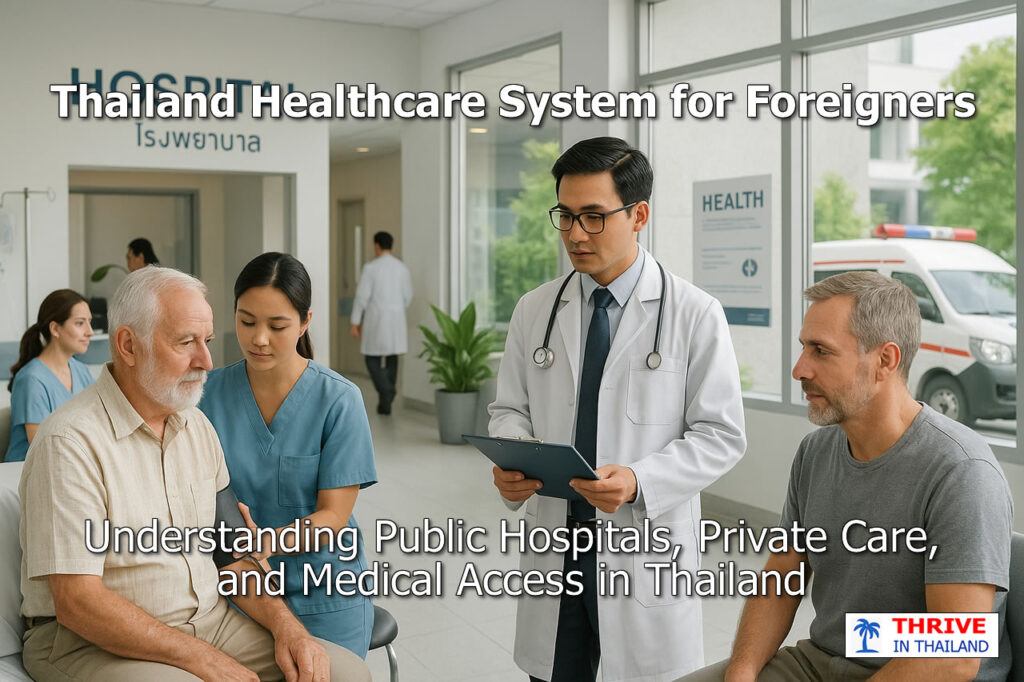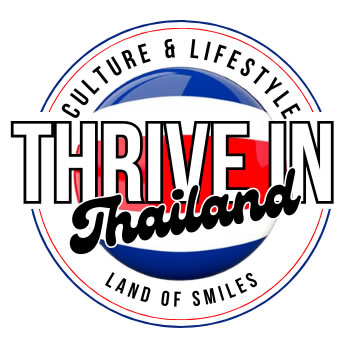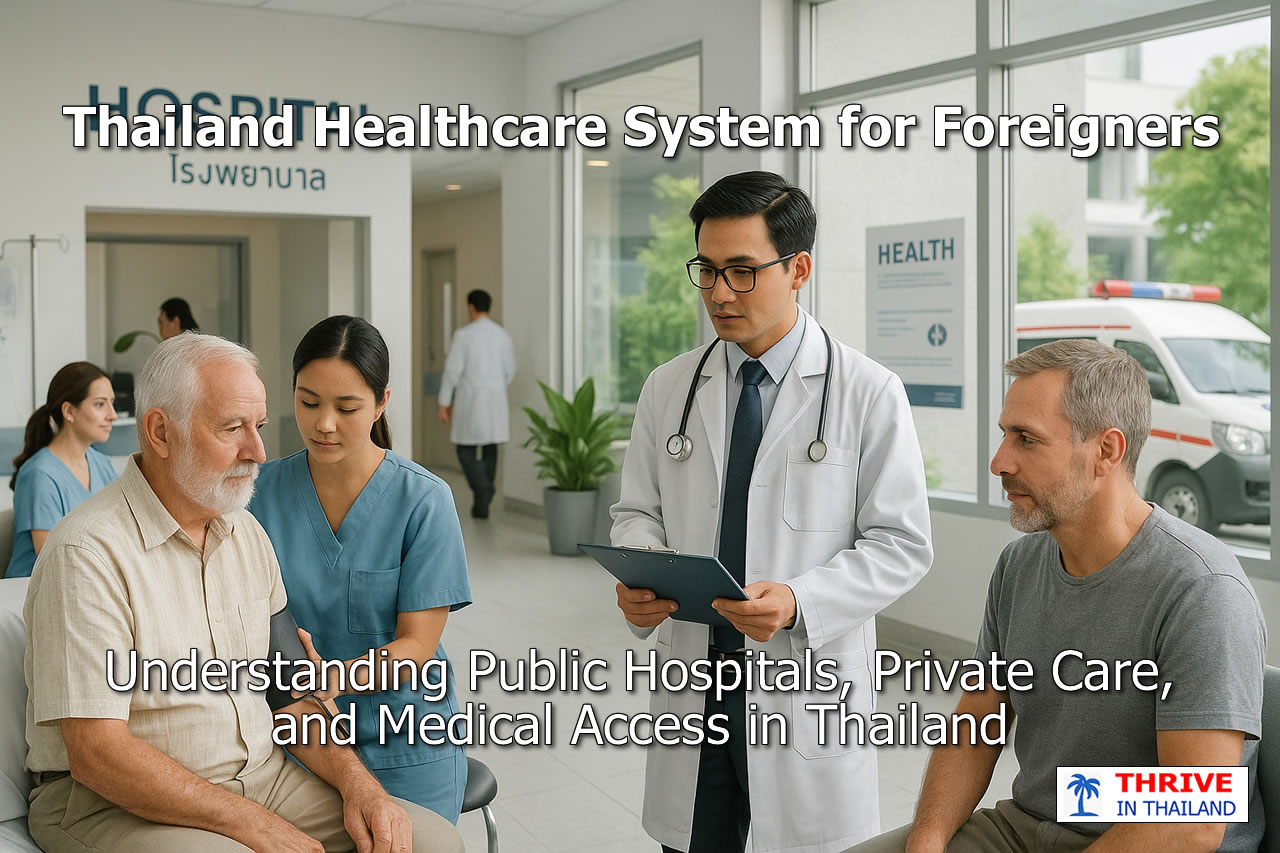
Thailand has a two-tier healthcare system, offering both public and private healthcare options. The country is known for its high medical standards, especially in major cities like Bangkok, Chiang Mai, and Phuket, where expats and medical tourists can find world-class treatment at competitive prices.
Understanding the differences between the public and private sectors in Thailand’s healthcare system is important for you as a foreigner to make an educated choice that suits both your means and needs.
Public vs. Private Healthcare in Thailand
Public Healthcare: Affordable but Crowded
Thailand has a universal healthcare system, which primarily serves Thai citizens. Expats who work in Thailand and contribute to social security payments can access basic public healthcare services under the Universal Coverage Scheme (UCS).
Pros of Public Hospitals:
- Affordable (low-cost or free for working expats under UCS).
- Highly trained doctors (many studied abroad).
- Wide availability in all provinces.
Cons of Public Hospitals:
- Long waiting times (overcrowding is common).
- Older facilities and outdated equipment (compared to private hospitals).
- Limited English-speaking staff (language barriers can be challenging).
- Patients are assigned to specific hospitals (expats under UCS cannot choose their hospital).
Private Healthcare: High-Quality but Expensive
Thailand’s private hospitals are among the best in Asia, attracting medical tourists from around the world. Many first-rate private hospitals easily meet international healthcare standards, with modern facilities, advanced technology, and English-speaking doctors.
Pros of Private Hospitals:
- High-quality care with modern equipment.
- Shorter wait times (appointments available within hours or days).
- English-speaking doctors & staff (some even speak multiple languages).
- More personalized services (VIP-style medical care).
- International accreditations (e.g., Bumrungrad International Hospital is JCI-accredited).
Cons of Private Hospitals:
- Expensive (without insurance, costs can be as high as Western countries).
- Not covered by UCS (unless paying privately or through insurance).
- Over-reliance on expensive treatments (some hospitals may recommend unnecessary tests to increase bills).
Dental Care in Thailand
Thailand is one of the best places in the world for high-quality, affordable dental care, making it popular among expats, digital nomads, retirees, and medical tourists seeking world-class treatment at a fraction of the cost.
Whether you need a routine check-up, teeth whitening, braces, implants, or even complex procedures like full-mouth reconstruction, Thailand’s modern private dental clinics offer premium services, English-speaking dentists, and cutting-edge technology – often at 50–70% lower prices than in Western countries.
Health Insurance in Thailand – Essential for Expats!
Since most foreigners are not eligible for free healthcare in Thailand, having health insurance is strongly recommended to avoid high out-of-pocket costs at private hospitals.
- Expats can choose between international and local insurance.
- International insurance is preferred for its wider coverage, flexibility, and portability.
- Expats on retirement visas must meet minimum health insurance requirements.
- Digital platforms like i-Brokers make insurance comparison and purchase easier.
- Major insurance providers include Cigna, AXA, April International, and HCI.
Don’t wait until you’re facing an emergency. Get the facts, compare plans, and make an informed choice in my full Thailand Health Insurance Guide.
📌 I find it absolutely irresponsible to live in Thailand without having proper health insurance, especially if you have a family with children! A medical emergency or serious illness can cause financial ruin in the worst case or being forced to return to your home country, where you might be entitled to free healthcare.
Hopefully such a case never occurs, but think carefully before you decide how you want to protect yourself and your loved ones against this risk. But that’s just my opinion…
Risks of Not Having Health Insurance:
- A simple hospital visit can cost thousands of dollars at private hospitals.
- Medical emergencies (e.g., surgery, ICU, accidents) can be financially devastating.
- Some visas (retirement, long-term) require mandatory health insurance.
- Some hospitals refuse treatment without upfront payment if you don’t have insurance.
Frequently Asked Questions (FAQs)
Is the Healthcare System in Thailand Good?
Yes, Thailand’s healthcare system is one of the best in Southeast Asia, with world-class private hospitals and a strong public health infrastructure. Many private hospitals meet international standards, making Thailand a top destination for medical tourism.
Can Foreigners Go to Public Hospitals in Thailand?
Yes, foreigners can use public hospitals, but most are not covered under the UCS unless they are employed in Thailand and contribute to the Social Security system. Non-working expats and tourists must pay out of pocket.
What Are the Problems with the Thailand Healthcare System?
- Overcrowding in public hospitals: Long wait times due to high patient demand.
- Cost barriers for private care: High-quality private hospitals are expensive without insurance.
- Language barriers: While private hospitals have English-speaking staff, public hospitals may not.
- Limited rural healthcare: Remote areas have fewer medical facilities and specialists.
How Much Is Medical Insurance in Thailand for Foreigners?
- Basic local insurance: Starts at 20,000–50,000 THB/year ($550–$1,400).
- International insurance: Costs 50,000–200,000 THB/year ($1,400–$5,500) depending on coverage.
- Premium plans with worldwide coverage are more expensive but offer better flexibility.
What Is the Main Health Problem in Thailand?
- Non-communicable diseases (NCDs) such as diabetes, heart disease, and high blood pressure are major health issues.
- Dengue fever and air pollution-related illnesses are also common.
Is Healthcare Free for Foreigners in Thailand?
No, healthcare is not free for most foreigners. Only expats working in Thailand and contributing to Social Security are covered under the UCS. Tourists and retirees must pay for medical services or have private insurance.
How Much Does It Cost to Go to the Hospital in Thailand?
- Public hospitals: 100–500 THB ($3–$15) for a basic consultation.
- Private hospitals: 1,000–3,000 THB ($30–$90) for a doctor’s visit.
- Emergency care & surgeries: Can cost thousands of dollars without insurance.
Medical Tourism in Thailand
Thailand is a top global destination for medical tourism, attracting millions of international patients yearly. More than 60 hospitals in Thailand are accredited by the Joint Commission International (JCI) offering affordable, high-quality healthcare. The country is well known for cosmetic surgery, fertility treatments, dental care, and wellness retreats and treatments cost 50-70% less than in Western countries.
Best Hospitals for Medical Tourism in Thailand include:
- Bumrungrad International Hospital (Bangkok) – One of Asia’s top private hospitals.
- Bangkok Hospital (nationwide) – High-end private healthcare network.
- Samitivej Hospital (Bangkok & Pattaya) – Premium expat-friendly medical center.
Emergency Services in Thailand
Emergency Phone Numbers:
- Police: 191
- Ambulance & Medical Emergencies: 1669
- Fire Department: 199
- Tourist Police: 1155 (for foreigners)
- Highway Police: 1193
- Marine Police: 1196
- Emergency Medical Service (EMS): 1646
Public emergency services have language barriers; private ambulance services are more expat-friendly. Traffic congestion can delay emergency response; self-transport may be faster in critical cases.
Common Health Risks for Expats
Thailand offers a high quality of life, excellent healthcare, and a welcoming atmosphere, but it also comes with health risks that you should be aware of to avoid unnecessary medical issues and stay healthy.
Dengue Fever & Mosquito-Borne Diseases
Dengue fever is a viral illness spread by mosquitoes, particularly the Aedes mosquito, which is most active during the daytime. Symptoms include:
- High fever
- Severe headaches
- Joint & muscle pain (“breakbone fever”)
- Skin rash
- Bleeding (in severe cases, can be life-threatening)
Dengue fever is common in Thailand, especially during the rainy season (June–October). Protect yourself by using repellent, wearing protective clothing, and avoiding mosquito breeding areas. There is no specific cure for dengue, and severe cases can require hospitalization. The best approach is prevention.

Food Poisoning & Stomach Issues
Thailand is famous for its amazing street food, but hygiene standards vary. Expats and tourists often experience “Bangkok Belly” or food poisoning due to:
- Unclean street food stalls (poor food handling).
- Tap water contamination (never drink tap water in Thailand).
- Spicy & unfamiliar foods (can irritate sensitive stomachs).
Avoid raw foods, stick to bottled water and be cautious with ice. Probiotics can help your stomach adjust to local bacteria.
Air Pollution & PM2.5 Health Risks
Thailand’s air quality is generally good, but some regions suffer from serious pollution, especially during burning season (Feb–April) when farmers burn fields, causing dangerous PM2.5 pollution levels.
- Chiang Mai & Northern Thailand – The worst pollution occurs here during burning season (February to April), with PM2.5 levels exceeding WHO safety standards.
- Bangkok – Air pollution can spike due to traffic congestion & industrial emissions, especially in the cool season (December–February).
Health Effects of Air Pollution
- Respiratory problems (coughing, shortness of breath).
- Increased risk of heart disease & lung issues.
- Irritation of eyes, throat, and skin.
If you are in Thailand during peak pollution periods,especially in Chiang Mai & Bangkok check air quality daily (Apps like AirVisual or Air4Thai), wear an N95 mask (normal masks don’t block PM2.5 particles) and stay indoors on high-pollution days.
Coping with Thailand’s Heat & Humidity
Thailand has a tropical climate, meaning it’s hot and humid year-round, with temperatures often exceeding 35°C (95°F). The hottest months are March–May, and humidity can reach over 80%, making it feel even hotter.
Common Heat-Related Health Issues
- Heat exhaustion – Dizziness, excessive sweating, fatigue.
- Heatstroke (life-threatening) – High fever, confusion, fainting.
- Dehydration – Lack of fluids causes headaches, weakness.
📌 Here you can find practical tips to help you stay cool(er) and more comfortable in the tropics: Coping With Heat And Humidity In Thailand – Surviving (and Thriving) Under The Thai Sun
Retirement & Long-Term Care
Thailand has become an increasingly popular retirement destination. While most retirees are active and independent, some eventually require long-term care, assisted living, or nursing home services. Unlike Western countries, where such facilities are widespread, Thailand’s elder care options are more limited but growing in demand.
📌 What happens if independent living is no longer an option? Here is a full guide about: Long Term Care Options for Foreigners in Thailand
For retirees who don’t need medical care but want a supportive community, independent living & retirement villages are available in Pattaya, Hua Hin and Koh Chang. Nursing homes & assisted living options exist in cities like Chiang Mai and Pattaya.
Final Thoughts
I hope this article provides a good overview about Thailand’s healthcare system and helps you to develop a good healthcare strategy in advance to ensure peace of mind when living in Thailand.
💬 Please drop any questions, suggestions and experiences in the comments below.

